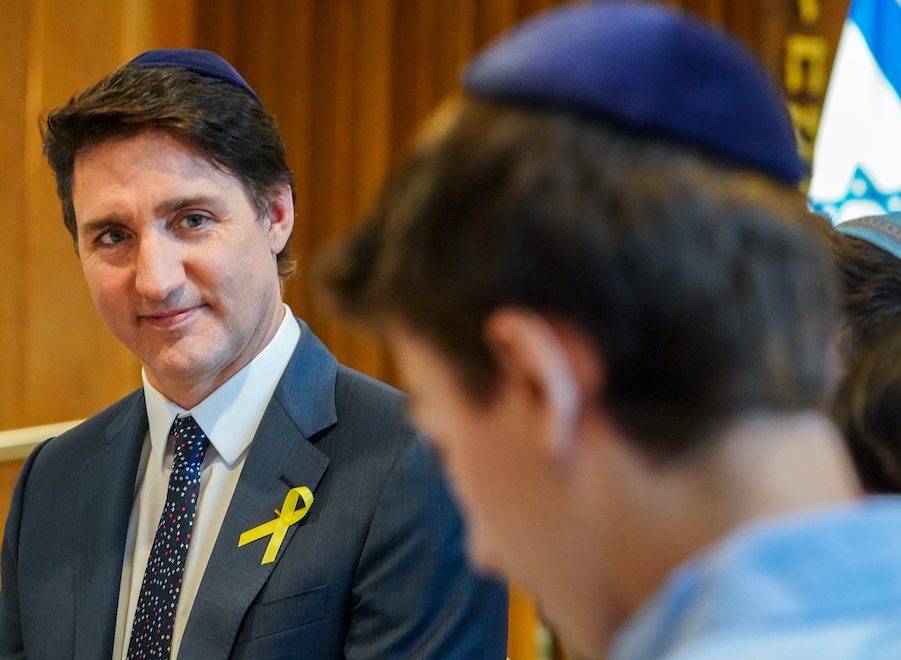A new Angus Reid Institute survey on how religious communities intend to vote reveals varying preferences, but the data tells the same story across the board: the Liberal Party is in trouble.
Prime minister Justin Trudeau and the Liberals were not the first choice of any single religious group. Instead, support for the Conservative Party of Canada led in all surveyed groups, with the exceptions of atheists and Muslims, who indicated an overall preference for the New Democratic Party (NDP).
You may unsubscribe from any of our newsletters at any time.
Angus Reid surveyed 3,459 Canadians in April for its research, which was released on May 16. Canadians aren’t expected to go back to the polls until October 2025.
Sociologist and University of Waterloo professor Sarah Wilkins-Laflamme has studied voting trends across various religious groups in Canada. She has observed that members of certain faith groups are more likely to vote for certain political parties, a trend called the “group identity effect.” According to Wilkins-Laflamme, this phenomenon is related to historical and contemporary relationships between parties and faith groups. For example, Protestants have historically voted for the Conservatives, whereas Catholics have voted for the Liberals.
While the recent Angus Reid Institute’s data reflects a Protestant preference for the Conservatives –– with 58 percent of Mainline Protestants and 73 percent of Evangelical Christians planning to vote for the Conservatives –– only 24 percent of Catholic respondents are planning to vote for the Liberals, despite the historical ties that Wilkins-Laflamme described.
Political scientist Jamie Levin said that, because the Liberal Party has historically championed multiculturalism and favoured immigration, it often appeals to members of religious minority groups, such as Jews and Muslims. Even still, the Liberals trailed behind other parties in both of these communities. Muslim respondents were most likely to support the NDP, at 41 percent, and Jewish respondents were most likely to support the Conservatives, at 42 percent.
Despite Muslims and Jews lowering their support for Trudeau, they were still more likely to support the Liberals than any other surveyed group. Thirty-one percent of Muslim respondents and 33 percent of Jewish respondents reported supporting the Liberals in the next election. Atheists and Mainline Protestants were the next most likely groups to support the Liberals, at 25 percent each.
More on Broadview:
- United Church moderator, other church leaders march on Parliament Hill to call for Gaza ceasefire
- Navigating faith and duty during a wartime Easter
- Home Away from Home
The Angus Reid Institute report highlighted the fact that Jewish and Muslim respondents seem to be increasingly disillusioned with the Liberals, particularly amidst the Hamas-Israel war and the ongoing humanitarian crisis in Gaza. Forty-nine percent of Jewish respondents and 51 percent of Muslim respondents reported a worsening opinion of Trudeau in the weeks leading up to the survey.
Levin said that Jewish and Muslim voters may feel that “the Liberal party has basically equivocated on the conflict.”
Levin said that he would expect the Liberals to “face criticism by Muslim Canadians for not holding Israel to account for the humanitarian crisis and for not doing enough to actually address the humanitarian crisis.”
In particular, Levin noted that the Trudeau government could face criticism for their temporary funding cut to the United Nations Relief and Works Agency (UNRWA) in January. At the same time, he said that the governing Liberals initially reinstated funding to UNRWA in 2016 after the Stephen Harper administration cut the organization off.
In terms of Jewish voters, Levin said, “I think the concern is that there’s been insufficient support, and in particular, a failure to call out anti-semitism in a very full throated fashion.”
Levin also highlighted that the Hamas-Israel war and the ongoing humanitarian crisis in Gaza are likely not just key election issues for Jewish and Muslim voters but for diverse voters across Canada.
“Perhaps, given Canada’s sort of privileged role in the post-[Second World War] era, [foreign policy] hasn’t necessarily played a big role as a [key] issue in Canadian politics. But given changing demographics in the country and given the extreme events in the Middle East, I think that is not true today,” Levin said.
Despite Trudeau’s trailing popularity in Jewish and Muslim communities, it seems that Muslim and Jewish voters have thus far been reluctant to completely jump ship. While the Conservatives have garnered support from over 50 percent of Sikhs, Hindus, Mainline Protestants and Evangelical Christians surveyed, Muslim and Jewish respondents are more evenly split between parties, along with atheists and those without religious identities.
Levin discussed potential “push factors” that could be preventing a large bump in Jewish support for the Conservatives.
“The question that [Conservative leader Pierre] Poilievre will face is his associations with extremist groups,” Levin said, noting that this might push away Jewish voters, as members of a religious minority.
Compared to the “uphill battle” ahead of the Conservatives, Levin speculated that the NDP might “have a much easier time attracting Muslim voters as we approach this election.” Here, Levin noted that the NDP has adopted more decisive views on the Hamas-Israel conflict, citing their move to introduce legislation to see Canada recognize the State of Palestine.
Still, Levin acknowledged that, much like the Conservatives and Jewish voters, the NDP has not seen a significant spike in Muslim voters. “It hasn’t happened yet,” Levin said.
Both Levin and Wilkins-Laflamme also highlighted the relevance of other factors and cautioned against reading this data as absolute.
Wilkins-Laflamme noted that support for the Liberals wanes across religious groups “because the Liberals have been in power for many years now, and there’s a lot of fatigue.” Levin highlighted the relevance of other key issues in the next election, such as inflation, taxation and housing policy.
“We have ethnic identities. We have regional identities. We have gender identities. We have class identities,” Levin said. “We have all these things, and they all figure into our voting preferences.”
***
Amarah Hasham-Steele is a Broadview summer intern, based in Toronto.














